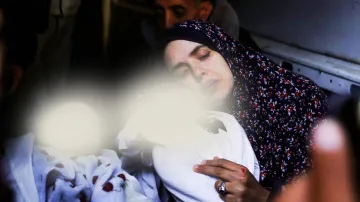Gaza: It took 10 years and three rounds of in vitro fertilization for Rania Abu Anza to become pregnant, and only seconds for her to lose her five-month-old twins, a boy and a girl. An Israeli strike hit the home of her extended family in the southern Gaza city of Rafah late Saturday, killing her children, her husband and 11 other relatives and leaving another nine missing under the rubble, according to survivors and local health officials.
She had woken up at around 10 pm to breastfeed Naeim, the boy, and went back to sleep with him in one arm and Wissam, the girl, in the other. Her husband was sleeping beside them. The explosion came an hour and a half later. The house collapsed. “I screamed for my children and my husband,” she said Sunday, as she sobbed and cradled a baby’s blanket to her chest. ”They were all dead. Their father took them and left me behind.”
She closed her eyes, leaned her head against the wall and patted the bundle in a calming gesture that, finally, she’d had the chance to give.
Israeli airstrikes have regularly hit crowded family homes since the start of the war in Gaza, even in Rafah, which Israel declared a safe zone in October but is now the next target of its devastating ground offensive. The strikes often come without warning, usually in the middle of the night. Israel says it tries to avoid harming civilians and blames their deaths on the Hamas militant group because it positions fighters, tunnels and rocket launchers in dense residential areas. But the military rarely comments on individual strikes, which often kill women and children.
14 of family members killed in Israeli attack
The military on Sunday didn’t comment on this attack but said it “follows international law and takes feasible precautions to mitigate civilian harm.” Of the 14 people killed in the Abu Anza house, six were children and four were women, according to Dr Marwan al-Hams, director of the hospital where the bodies were taken. In addition to her husband and children, Rania also lost a sister, a nephew, a pregnant cousin and other relatives.
Farouq Abu Anza, a relative, said about 35 people were staying at the house, some of whom had been displaced from other areas. He said they were all civilians, mostly children, and that there were no militants among them.
Rania and her husband, Wissam, both 29, spent a decade trying to get pregnant. Two rounds of IVF had failed, but after a third, she learned she was pregnant early last year. The twins were born on October 13.
“I swear I didn’t get enough of them": Ill-fated mother
Her husband, a day labourer, was so proud he insisted on naming the girl after himself, she said. “I didn’t get enough of them,” she said. “I swear I didn’t get enough of them.”
Until Saturday, the Abu Anza family had been relatively fortunate. Rafah has been spared the immense destruction of northern Gaza and the southern city of Khan Younis, where Israeli tanks and ground troops have fought militants block by block after waves of airstrikes. Rafah is also in the shrinking area of Gaza where humanitarian aid can still be delivered.
But Israel has said Rafah will be next, and the roughly 1.5 million people who have sought refuge there will be relocated, without saying where. “We have no rights,” Rania said. “I lost the people who were dearest to me. I don’t want to live here. I want to get out of this country. I’m tired of this war.”
(With inputs from agency)
Also Read: 'We put our lives in danger, but...': Gaza residents resort to eating mallow plant amid food shortages I VIDEO
Latest World News
